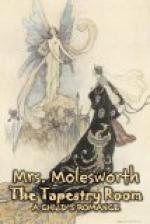“Houpet” was Jeanne’s favourite of the three chickens. He had come by his name on account of a wonderful tuft of feathers on the top of his head, which stuck straight up and then waved down again, something like a little umbrella. No doubt he was a very rare and wonderful chicken, and if I were clever about chickens I would be able to tell you all his remarkable points. But that I cannot do. I can only say he was the queerest-looking creature that ever pecked about a poultry-yard, and how it came to pass that Jeanne admired him so, I cannot tell you either.
“Poor Houpet!” she repeated, as she ran across the tapestry room to the uncurtained window; “I am sure he must have been very sad without me all day. He has such a loving heart. The others are nice too, but not half so loving. And Grignan has no heart at all; I suppose tortoises never have; only he is very comical, which is nearly as nice. As for Dudu, I really cannot say, he is so stuck up, as if he knew better than any one else. Ah, there he is, the old fellow! Well, Dudu,” she called out, as if the raven could have heard her so far off and through the closely shut window; “well, Dudu, how are you to-day, my dear sir? How do you like the snow and the cold?”
Dudu calmly continued his promenade up and down the terrace. Jeanne could clearly distinguish his black shape against the white ground.
“I am going downstairs to see mamma, Dudu,” she went on. “I love mamma very much, but I wish she wasn’t my mother at all, but my sister. I wish she was turned into a little girl to play with me, and that papa was turned into a little boy. How funny he would look with his white hair, wouldn’t he, Dudu? Oh, you stupid Dudu, why won’t you speak to me? I wish you would come up here; there’s a beautiful castle and garden in the tapestry, where you would have two peacocks to play with;” for just at that moment the moon, passing from under a cloud, lighted up one side of the tapestry, which, as Jeanne said, represented a garden with various curious occupants. And as the wavering brightness caught the grotesque figures in turn, it really seemed to the little girl as if they moved. Half pleased, half startled at the fancy, she clapped her hands.
“Dudu, Dudu,” she cried, “the peacocks want you to come; they’re beginning to jump about;” and almost as she said the words a loud croak from the raven sounded in her ears, and turning round, there, to her amazement, she saw Dudu standing on the ledge of the window outside, his bright eyes shining, his black wings flapping, just as if he would say,
“Let me in, Mademoiselle, let me in. Why do you mock me by calling me if you won’t let me in?”
Completely startled by this time, Jeanne turned and fled.
“He must be a fairy,” she said by herself; “I’ll never make fun of Dudu any more—never. He must be a fairy, or how else could he have got up from the terrace on to the window-sill all in a minute? And I don’t think a raven fairy would be nice at all; he’d be a sort of an imp, I expect. I wouldn’t mind now if Houpet was a fairy, he’s so gentle and loving; but Dudu would be a sort of ogre fairy, he’s so black and solemn. Oh dear, how he startled me! How did he get up there? I’m very glad I don’t sleep in the tapestry room.”




